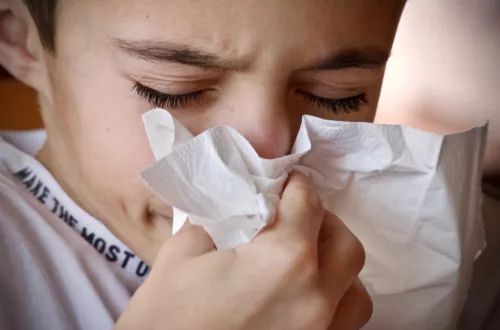Natural Remedies for Winter Headaches. Winter can be a beautiful season, but it can also bring about some unpleasant side effects. One of the most common issues people face during this season is headaches and migraines. Winter headaches and migraines can be caused by a variety of factors, such as changes in temperature, lack of sunlight, and even holiday stress.
Disclaimer: This article is provided for informational purposes only and should not replace professional medical advice. Please consult with a qualified healthcare practitioner or herbalist before using any herbal remedies.
Understanding the causes of winter headaches and migraines is the first step in finding relief. Common triggers for headaches and migraines include dehydration, poor sleep, and stress. Diet and hydration play a significant role in the prevention and treatment of headaches and migraines. Incorporating nutrient-rich foods and staying hydrated can help reduce the frequency and severity of winter headaches and migraines.
Key Takeaways~ Natural Remedies for Winter Headaches
- Winter headaches and migraines can be caused by changes in temperature, lack of sunlight, and holiday stress.
- Common triggers for headaches and migraines include dehydration, poor sleep, and stress.
- Incorporating nutrient-rich foods and staying hydrated can help reduce the frequency and severity of winter headaches and migraines.
Understanding Headaches and Migraines
As the winter season approaches, many of us may start to experience headaches and migraines more frequently. Headaches can be caused by a variety of factors, including stress, poor posture, dehydration, and lack of sleep. Migraines, on the other hand, are a type of headache that is often accompanied by other symptoms such as nausea, sensitivity to light and sound, and visual disturbances.
There are several types of headaches, including tension headaches, cluster headaches, sinus headaches, and chronic migraines. Tension headaches are the most common type and are often caused by stress or muscle tension in the neck and shoulders. Cluster headaches are less common but are often described as a sharp, stabbing pain that occurs on one side of the head. Sinus headaches are caused by inflammation in the sinuses, while chronic migraines are defined as having 15 or more headache days per month.
Migraines
Migraine attacks can be triggered by a variety of factors, including stress, certain foods, hormonal changes, and changes in sleep patterns. Some people also experience an “aura” before a migraine attack, which can include visual disturbances, tingling sensations, and difficulty speaking.
If you experience frequent headaches or migraines, it’s important to talk to your healthcare provider to rule out any underlying medical conditions. In addition to medical treatments, there are also several natural remedies that may help alleviate symptoms. These include:
- Drinking plenty of water to stay hydrated
- Practicing relaxation techniques such as deep breathing or meditation
- Getting regular exercise to reduce stress and tension in the body
- Avoiding trigger foods such as caffeine, alcohol, and processed foods
- Using essential oils such as lavender or peppermint to help alleviate symptoms
By understanding the different types of headaches and migraines, as well as their symptoms and triggers, we can take steps to manage and alleviate our symptoms. If you experience frequent or severe headaches or migraines, it’s important to seek medical attention to rule out any underlying medical conditions.
Common Triggers of Headaches and Migraines
As the winter months approach, many of us are more susceptible to headaches and migraines. While there are many natural remedies that can help alleviate these symptoms, it’s important to understand the common triggers that can cause them in the first place. Here are some of the most common triggers of headaches and migraines:
Stress
Stress is a common trigger for headaches and migraines. When we’re stressed, our bodies release hormones that can cause tension in our muscles and blood vessels, leading to headaches and migraines. It’s important to find ways to manage our stress levels, such as through exercise, meditation, or talking to a therapist.
Dehydration
Dehydration can also be a trigger for headaches and migraines. When we’re dehydrated, our brains can shrink, causing pain and discomfort. It’s important to drink plenty of water throughout the day, especially during the winter months when we may not feel as thirsty.
Alcohol and Caffeine
Caffeine and alcohol can both be triggers for headaches and migraines. Alcohol can cause dehydration, while caffeine can cause changes in blood flow to the brain. It’s important to consume these substances in moderation, or avoid them altogether if they tend to trigger your symptoms.
Anxiety and Fatigue
Anxiety and fatigue can also be triggers for headaches and migraines. When we’re anxious or tired, our bodies release hormones that can cause tension and pain in our muscles and blood vessels. It’s important to get adequate rest and practice stress-reducing techniques to help manage these triggers.
Food Triggers
Certain foods can also be triggers for headaches and migraines. Common food triggers include processed foods, aged cheese, chocolate, and alcohol. It’s important to keep track of what you eat and when you experience symptoms, so you can identify any potential food triggers.
Sensitivity to Light
Sensitivity to light can also be a trigger for headaches and migraines. This is especially common during the winter months when the days are shorter and we’re exposed to more artificial light. It’s important to wear sunglasses and limit exposure to bright lights, especially during the evening hours.
By understanding these common triggers, we can take steps to prevent headaches and migraines from occurring in the first place. With a little bit of effort and some natural remedies, we can keep our bodies healthy and pain-free throughout the winter months.
Role of Diet and Hydration
As we all know, diet and hydration play a crucial role in maintaining our overall health. But did you know that they can also have an impact on our headaches and migraines during the winter season? Let’s explore how we can use diet and hydration as natural remedies to alleviate these symptoms.
Hydration~ Natural Remedies for Winter Headaches
Staying hydrated is key to preventing headaches and migraines. In the winter season, we tend to drink less water, which can lead to dehydration. Dehydration can cause headaches, so it’s essential to stay hydrated by drinking water and other fluids regularly. We recommend drinking at least eight glasses of water a day to keep yourself hydrated.
Diet~ Natural Remedies for Winter Headaches
Diet also plays a significant role in preventing headaches and migraines. Skipping meals or going too long without eating can cause headaches. It’s essential to eat regularly and maintain a balanced diet to prevent headaches and migraines. Here are some nutrients that can help:
- Magnesium: Magnesium has been shown to reduce the frequency of migraines. Foods rich in magnesium include spinach, almonds, avocado, and dark chocolate.
- Omega-3 Fatty Acids: Omega-3 fatty acids have anti-inflammatory properties that can help reduce the severity of migraines. Foods rich in omega-3 fatty acids include salmon, tuna, and other fatty fish.
- B Vitamins: B vitamins, particularly riboflavin (B2), can help reduce the frequency and severity of migraines. Foods rich in B vitamins include leafy greens, whole grains, and eggs.
- Elimination Diet: Some people may have food triggers that can cause headaches and migraines. An elimination diet can help identify these triggers.
Other Considerations~ Natural Remedies for Winter Headaches
Other factors to consider when it comes to diet and headaches/migraines include:
- Serotonin: Serotonin is a neurotransmitter that can affect our mood and headaches. Foods that increase serotonin levels include turkey, bananas, and nuts.
- Coffee: While caffeine can help alleviate headaches, too much caffeine can cause headaches.
- Monosodium Glutamate (MSG): MSG is a food additive that can trigger headaches in some people.
By maintaining a balanced diet and staying hydrated, we can prevent headaches and migraines during the winter season. Remember to drink plenty of water and eat a balanced diet rich in nutrients like magnesium, omega-3 fatty acids, and B vitamins. If you suspect that certain foods may be triggering your headaches or migraines, consider an elimination diet to identify your triggers.
Natural Remedies for Headache and Migraine Relief
As the winter months approach, many of us are prone to headaches and migraines. Fortunately, there are several natural remedies that can help relieve the pain and discomfort associated with these conditions.
Magnesium~ Natural Remedies for Winter Headaches
Magnesium is an essential mineral that can help prevent and treat migraines. Studies have shown that people who suffer from migraines often have low levels of magnesium in their bodies. You can increase your magnesium intake by eating foods such as almonds, spinach, and avocado, or by taking a magnesium supplement.
Herbal Remedies~ Natural Remedies for Winter Headaches
Herbal remedies, such as ginger and feverfew, have been used for centuries to treat headaches and migraines. Ginger has anti-inflammatory properties that can help reduce pain and inflammation, while feverfew has been shown to help prevent migraines. You can take these herbs in supplement form or drink ginger tea to help relieve your symptoms.
Essential Oils~ Natural Remedies for Winter Headaches
Essential oils, such as lavender and peppermint, can also be effective in relieving headaches and migraines. Lavender oil has a calming effect that can help reduce stress and tension, while peppermint oil has a cooling effect that can help soothe headaches. You can apply these oils topically or use them in a diffuser to inhale the scent.
Acupressure~ Natural Remedies for Winter Headaches
Acupressure is a traditional Chinese medicine technique that involves applying pressure to specific points on the body to relieve pain and discomfort. There are several acupressure points that can help relieve headaches and migraines, including the temples, the base of the skull, and the webbing between the thumb and index finger.
Cold Compress~ Natural Remedies for Winter Headaches
A cold compress, such as an ice pack or a cold towel, can help reduce inflammation and numb the pain associated with headaches and migraines. You can apply a cold compress to your forehead or the back of your neck for 15-20 minutes at a time to help relieve your symptoms.
In summary, there are several natural remedies that can help relieve the pain and discomfort associated with headaches and migraines. By incorporating these remedies into your daily routine, you can help prevent and treat these conditions without relying on medication.
Role of Sleep and Stress Management~ Natural Remedies for Winter Headaches
When it comes to natural remedies for winter headaches and migraines, sleep and stress management play a crucial role. Lack of sleep and high levels of stress can trigger headaches and migraines, making it important to prioritize sleep and stress management in our daily routine.
Getting enough sleep is essential for our overall health and well-being. According to a study published in the Journal of Clinical Sleep Medicine, people who suffer from migraines are more likely to have sleep problems than those who don’t. It is recommended that adults get at least 7-9 hours of sleep per night to maintain good health.
In addition to getting enough sleep, stress management is also important for preventing headaches and migraines. Stress can trigger tension headaches and migraines, making it important to find ways to manage stress in our daily lives. Some effective stress management techniques include deep breathing, meditation, yoga, and exercise.
It’s also important to identify and avoid triggers that can lead to stress and headaches. Common triggers include caffeine, alcohol, and certain foods. Keeping a headache diary can help identify triggers and patterns, making it easier to avoid them in the future.
Overall, prioritizing sleep and stress management can go a long way in preventing winter headaches and migraines. By getting enough sleep, managing stress, and avoiding triggers, we can reduce the frequency and severity of headaches and migraines, leading to a happier and healthier winter season.
Physical Therapies for Headache and Migraine Relief
When it comes to natural remedies for winter headaches and migraines, physical therapies can be an effective option. These therapies include acupuncture, yoga, massage, biofeedback, and pressure points.
Acupuncture~ Natural Remedies for Winter Headaches
Acupuncture is an ancient Chinese practice that involves inserting thin needles into specific points on the body. This practice has been shown to be effective in reducing the frequency and intensity of headaches and migraines. According to a study published in the Journal of Traditional Chinese Medicine, acupuncture was found to be effective in treating migraines in 90% of patients.
Yoga~ Natural Remedies for Winter Headaches
Yoga is another physical therapy that has been shown to be effective in reducing the frequency and intensity of headaches and migraines. Combining physical postures, breathing exercises, and meditation, yoga helps to help reduce stress and tension in the body. This can help to alleviate the pain associated with headaches and migraines.
Massage~ Natural Remedies for Winter Headaches
Massage is another effective physical therapy for headache and migraine relief. The benefits of massage can help to reduce tension in the muscles and promote relaxation, which can help to alleviate the pain associated with headaches and migraines. According to a study published in the Journal of Headache and Pain, massage was found to be effective in reducing the frequency and intensity of headaches in 60% of patients.
Biofeedback~ Natural Remedies for Winter Headaches
Biofeedback is a technique that involves using electronic devices to monitor and control bodily functions, such as heart rate and muscle tension. This technique has been shown to be effective in reducing the frequency and intensity of headaches and migraines. According to a study published in the Journal of Headache and Pain, biofeedback was found to be effective in reducing the frequency and intensity of headaches in 70% of patients.
Pressure points are specific points on the body that, when stimulated, can help to alleviate the pain associated with headaches and migraines. These points include the temples, the base of the skull, and the area between the thumb and index finger. Applying pressure to these points for a few minutes can help to reduce the pain associated with headaches and migraines.
Overall, physical therapies can be an effective natural remedy for winter headaches and migraines. Whether you choose acupuncture, yoga, massage, biofeedback, or pressure points, these therapies can help to alleviate the pain associated with headaches and migraines and improve your overall quality of life.
Medications and Supplements for Headaches and Migraines
When it comes to treating headaches and migraines, there are many options available. Some people prefer to take prescription medication, while others opt for over-the-counter pain relievers or natural supplements. Here are some of the most common medications and supplements used to treat headaches and migraines:
Prescription Medication
Prescription medications can be effective in treating headaches and migraines, but they should only be taken under the guidance of a healthcare professional. Some commonly prescribed medications include:
- Triptans: These medications are used to treat migraines and work by constricting blood vessels in the brain.
- Ergotamines: These medications are also used to treat migraines and work by narrowing blood vessels in the brain.
- Beta-blockers: These medications are typically used to treat high blood pressure but can also be effective in preventing migraines.
Over-the-Counter Medication
Over-the-counter pain relievers can be effective in treating mild to moderate headaches and migraines. Some commonly used medications include:
- Acetaminophen: This medication can be effective in treating tension headaches and mild migraines.
- Nonsteroidal anti-inflammatory drugs (NSAIDs): These medications, such as ibuprofen and aspirin, can be effective in treating migraines and tension headaches.
Supplements
Some people prefer to use natural supplements to treat their headaches and migraines. While more research is needed to determine their effectiveness, some supplements that have been studied include:
- Magnesium: This mineral has been shown to be effective in reducing the frequency of migraines.
- Coenzyme Q10: This supplement has been shown to be effective in reducing the frequency and severity of migraines.
- Riboflavin: This vitamin has been shown to be effective in reducing the frequency of migraines.
It’s important to remember that not all supplements are created equal, and they may interact with other medications. It’s always best to talk to a healthcare professional before starting any new supplement regimen.
When to Consult a Healthcare Provider
When it comes to managing winter headaches and migraines, it’s important to know when to seek the advice of a healthcare provider. While natural remedies can be effective for some people, they may not work for everyone.
Here are some situations where it’s best to consult a healthcare provider:
- New or Severe Headaches: If you experience a new or severe headache that is unlike any you’ve had before, it’s important to seek medical attention. A healthcare provider can help determine if there is an underlying condition causing the headache and recommend appropriate treatment.
- Frequent Headaches: If you experience headaches more than twice a week, it’s important to talk to a healthcare provider. Frequent headaches can be a sign of an underlying condition and may require medical treatment.
- Headaches with Other Symptoms: If you experience headaches along with other symptoms such as fever, stiff neck, confusion, or difficulty speaking, it’s important to seek medical attention immediately. These symptoms can be a sign of a serious condition such as meningitis.
- Headaches that Interfere with Daily Life: If headaches are interfering with your daily life, it’s important to talk to a healthcare provider. They can help determine the cause of the headaches and recommend appropriate treatment options.
- History of Migraines: If you have a history of migraines, it’s important to talk to a healthcare provider about treatment options. A neurologist, the American Migraine Foundation, or the National Headache Foundation can provide guidance on managing migraines.
- Persistent Headaches: If you have persistent headaches that do not respond to natural remedies or over-the-counter medications, it’s important to seek medical attention. A healthcare provider can help determine the cause of the headaches and recommend appropriate treatment options.
Remember, it’s always better to err on the side of caution when it comes to your health. If you’re unsure whether or not to seek medical attention for your headaches, talk to a healthcare provider. They can help determine if medical attention is necessary and recommend appropriate treatment options.
Recent Research on Headaches and Migraines
As we continue to explore natural remedies for winter headaches and migraines, it’s important to understand the latest research on this topic. In recent years, several studies have been conducted to investigate the efficacy of natural remedies for headaches and migraines.
A meta-analysis of various studies found that some herbal remedies, such as feverfew and butterbur, may be effective in reducing the frequency and intensity of migraines. However, it’s important to note that these remedies should be taken under the guidance of a healthcare professional, as they can interact with other medications and have potential side effects.
The FDA has also approved a number of natural remedies for migraines, including magnesium, which has been shown to reduce the frequency and severity of migraines in some people. Additionally, the use of essential oils, such as peppermint and lavender, has shown promise in reducing the symptoms of headaches and migraines.
It’s important to keep in mind that while natural remedies can be effective for some people, they may not work for everyone. It’s always best to consult with a healthcare professional before trying any new remedies or supplements.
In summary, recent research has shown that some natural remedies, such as herbs and essential oils, may be effective in reducing the frequency and intensity of headaches and migraines. However, it’s important to use caution and consult with a healthcare professional before trying any new remedies or supplements.
Frequently Asked Questions
How can I relieve winter headaches naturally?
There are several natural remedies that can help relieve winter headaches. One of the most effective ways is to stay hydrated by drinking plenty of water. Additionally, you can try using a warm compress on your forehead or neck to help alleviate tension. Another natural remedy is to get regular exercise, which can help reduce stress and improve blood flow to the brain.
What are some home remedies for migraines?
There are several home remedies that can help alleviate migraines. One of the most effective is to use a cold compress on your forehead or neck. Additionally, you can try drinking ginger tea, which has been shown to have anti-inflammatory properties that can help reduce migraine pain. Another home remedy is to practice relaxation techniques such as deep breathing, meditation, or yoga.
Are there any foods that can help with headaches?
Yes, there are several foods that can help with headaches. Some of the best options include foods that are high in magnesium, such as nuts, seeds, and leafy greens. Additionally, foods that are rich in omega-3 fatty acids, such as fatty fish and flaxseed, can help reduce inflammation and alleviate headache pain.
What are some non-medicinal ways to treat headaches?
There are several non-medicinal ways to treat headaches. One of the most effective is to practice relaxation techniques such as deep breathing, meditation, or yoga. Additionally, you can try using a warm compress on your forehead or neck to help alleviate tension. Another option is to get regular exercise, which can help reduce stress and improve blood flow to the brain.
How can I prevent winter migraines?
One of the best ways to prevent winter migraines is to stay hydrated by drinking plenty of water. Additionally, you can try to avoid triggers such as stress, caffeine, and alcohol. Another option is to get regular exercise, which can help reduce stress and improve blood flow to the brain.
What are some natural anti-inflammatory options for migraines?
There are several natural anti-inflammatory options for migraines. One of the best is to eat a diet that is rich in anti-inflammatory foods such as fruits, vegetables, and whole grains. Additionally, you can try taking supplements such as omega-3 fatty acids, magnesium, and vitamin D, which have been shown to have anti-inflammatory properties.







